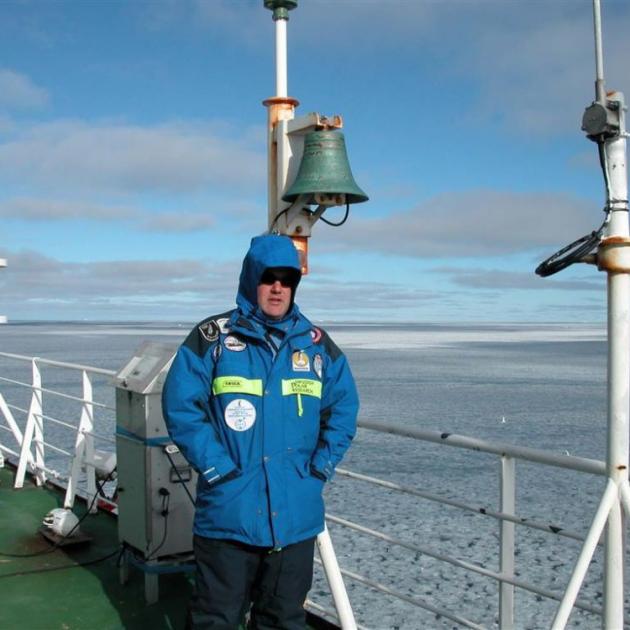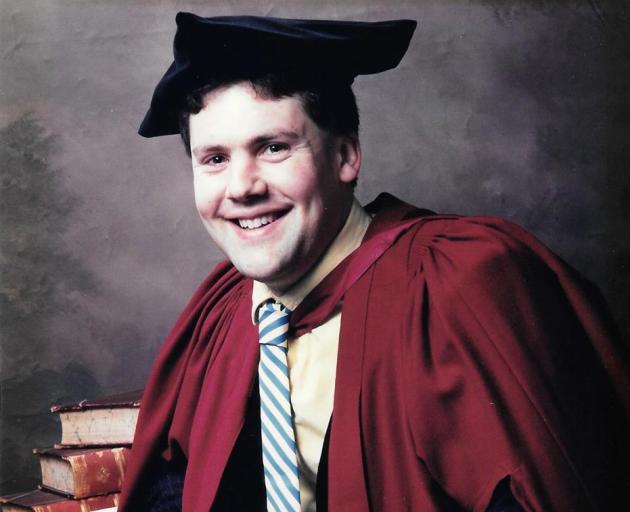
Internationally respected ocean chemist Prof Peter Croot, who is now based in Ireland, has vivid memories of seasickness as a University of Otago PhD student aboard a research vessel jostling through morning swells at Taiaroa Head.
Prof Croot joked that his best and worst memories of PhD study at Otago University involved "time spent on the RV Munida'', the university's research vessel, since replaced by the much larger, ocean-going Polaris II.
The worst part was usually "getting out through the swell at Taiaroa Head''.
Normally, this could be "quite rough. It was early in the morning and [there was] no chance to get used to the movement of the ship, so seasickness was a problem''.

Apparently, the master of Munida, Chris Spiers, would joke from time to time that two lunches could have to be provided if Prof Croot was on board for the rough crossing.
In any case, the best times came when the vessel passed over the shelf.
"The sea calmed, the sun shone and while the albatrosses flew, the sharks, dolphins, penguins and seals swam.
"Often there would be PhD students from geology, marine science on board also and this was a great way to learn about the different aspects of oceanography in situ.''
It also helped that Mr Spiers had a "great sense of humour and patience for the students onboard'', Prof Croot said.
Since 2012, Prof Croot has been continuing his innovative and award-winning research in ocean chemistry as head of the earth and ocean sciences department at the National University of Ireland, in Galway, Ireland.
One of the highlights of his wide-ranging trace element research has been working in the oxygen minimum zones of the Pacific and Atlantic.
"These are fascinating places to work and helped me develop links with scientists in South America.''
Prof Croot has a BSc (Hons) and PhD in chemistry from Otago University, the latter degree based on a thesis on the marine biogeochemistry of iron.
His thesis was supervised by Prof Keith Hunter, of Otago University's Centre for Chemical and Physical Oceanography.
Biogeochemistry is the study of the chemical, physical, geological, and biological processes and reactions that govern the composition of the natural environment.
Prof Hunter is Otago pro-vice-chancellor, sciences, and was among a team of scientists headed by Prof Philip Boyd, then at the Otago centre, which won the top $500,000 award in the Prime Minister's Science Prizes in 2011.
Prof Croot was back in Dunedin recently visiting his mother, Louise Croot, an Otago regional councillor, and friends at Otago University.
He reached New Zealand after a 41-day research expedition, from Chile to Wellington, accompanied by three students from the National University of Ireland.
He travelled aboard the 116m-long German deep ocean research vessel Sonne, which was launched in 2014, and the researchers had completed a 4600 nautical-mile transect of the South Pacific subtropical gyre, part of the earth's system of rotating ocean currents.
Prof Croot is keen for New Zealand to undertake more oceanographic research in the country's four million square kilometre exclusive economic zone - the fourth-largest EEZ in the world.
"New Zealand has one of the largest EEZs in the world, but yet so little is known really about the biogeochemistry of these waters and the sediments below.
"More research is urgently needed on how climate change may impact the primary producers [e.g. phytoplankton and most notably picoplankton] within the EEZ and what flow-on effects this could have on biogeochemical cycles as well as the abundance and distribution of commercial fisheries.
"My current research is motivated by how little we really know about ocean cycles and how this lack of knowledge hampers us in forecasting what will happen under climate change for, as the ocean becomes potentially warmer, more acidic and deoxygenated, we will see rapid changes in some marine ecosystems.''
His overall goal as a researcher is "to further our understanding of the biochemical and geochemical processes that drive elemental cycles in the ocean''.
After gaining his doctorate, Prof Croot was a postdoctoral investigator at the Woods Hole Oceanographic Institute, in Woods Hole, Massachussetts, in the United States.
His research continued through postdoctoral study at the University of Gothenburg, Sweden (1996-98), then the Netherlands Institute for Sea Research (1998-2002), and posts at the Institute for Ocean Science, in Kiel, Germany (1998-2002) and as a scientist at Plymouth Marine Laboratory, in Plymouth, England (2010-11).
Prof Croot is married to Chilean-born Gilda Bastidas.
Having Prof Hunter as a PhD supervisor "opened up a lot of doors when I first left New Zealand as his work was well known in North America and Europe and it has always been great to catch up with him either in Dunedin or elsewhere on the globe''.
Fact file
• Name: Peter Croot (47).
• University of Otago degrees: BSc (Hons) chemistry, 1990, PhD chemistry, 1994.
• Years of Otago study: 1987-94.
• Best and worst memories of Otago University: PhD research aboard the university's former research vessel, Munida.
CAREER HIGHLIGHTS
• 1994 Completed PhD at Otago, started postdoctoral research at the Woods Hole Oceanographic Research Institute, in the United States.
• 1999 Involved in the Southern Iron Enrichment Experiment (Soiree) with Niwa, and Otago University's Centre for Chemical and Physical Oceanography, in the Southern Ocean, while based in the Netherlands. This ‘‘ground-breaking'' experiment ‘‘opened a lot of doors in Europe''.
• 2012 Became Professor of Earth and Ocean Sciences (now head of department) at the National University of Ireland, Galway, west Ireland.
• 2013 Joint winner of the international Institution of Chemical Engineers Hutchison medal (Prof Philip Boyd, former director of the Otago centre, also won the award.)












